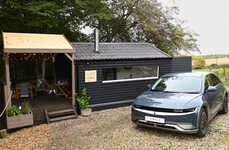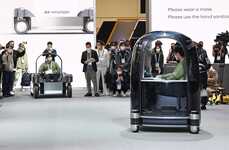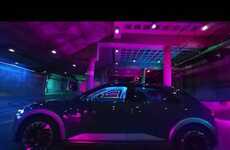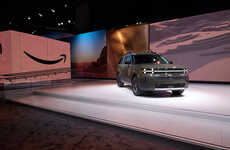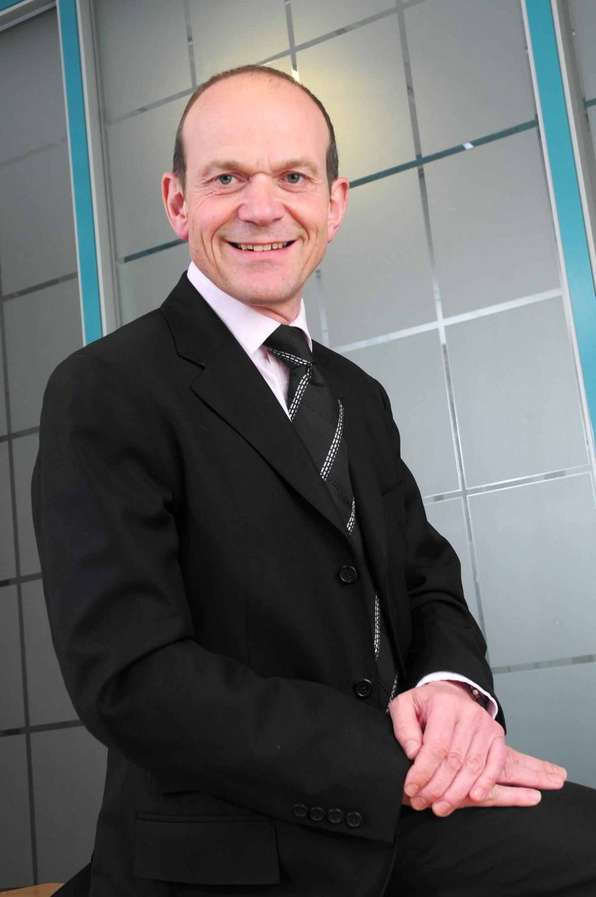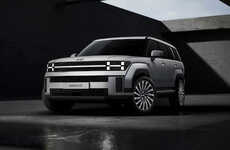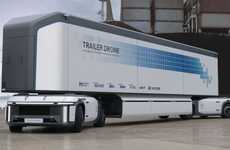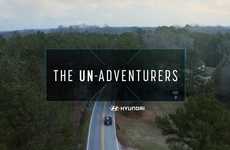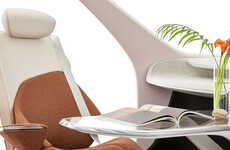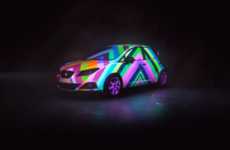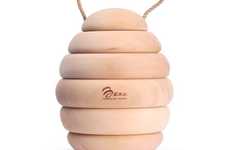
Senduran Bhakthakumaran — April 2, 2012 — Autos
References: businesscar & theautochannel
Tony Whitehorn's instatement as CEO and President of Hyundai Motors UK marked the first time that a managing director in Hyundai UK had ever been offered such a promotion. His work speaks for itself as the company can be deemed superior for presenting luxury vehicles at affordable prices with competitively-advantageous research and marketing.
Trend Hunter got the opportunity to get answers from Whitehorn about everything from his involvement with Hyundai to customer obsession.
13 Questions with Tony Whitehorn
1. How did you get involved in Hyundai and what motivates you to continue?
When I joined the company six years ago some people thought I was mad. Hyundai was a budget brand offering cheap cars. The possibility of being part of a big change in a brand from beginning to end was both risky and exciting. The risk paid off. The Hyundai brand has changed dramatically. It is no longer a budget brand, it is one that produces high-quality and efficient vehicles that offer true value and peace of mind. I’m working for the fifth largest and fastest growing automotive brand in the world. Now that is exciting!
My continued motivation is about not knowing what is going to be new each day I walk into the office. That’s the challenge of working with a different culture that is innovative, fast paced and wants to be the best it possibly can be.
2. How significant are the topics of cool hunting and trend spotting in the world of auto manufacturing?
It is fundamental to be innovative and trend spotting in our industry. At Hyundai, we believe it is good to be different. It's what keeps us ahead of the rest. We merge segments, challenge conventions and stride to offer cars that are stylish, efficient, practical and innovative -- all at the same time. Who would have thought that a car with two doors on one side and one door on the other would be so appealing -- that's the new Hyundai Veloster.
This determination to see things differently is what keeps us -- and our owners -- moving forward. It could be anything from creating core technologies for fuel cell, electric and hybrid cars to bringing communities together through international football sponsorship -- even manufacturing our own steel for our vehicles and designing our own robots to build them. Over the last 40 years, it's made us a leader, not a follower.
3. How do you define a trend?
Trend is a direction that gathers momentum.
4. How do you define cool?
Cool is a direction that is aspirational and desirable.
5. Do you need a culture of innovation to create something that is cool?
The obvious answer is "yes." But that's not always the case. However, whilst cool is often innovative, innovative is not always cool…
6. What is the best way to create an infectious idea, product or service?
Know the customer better than they know themselves. Cool and infectious ideas/products and services are usually created for a customer when they didn't even know they needed it!
Hyundai’s philosophy is called ‘New Thinking. New Possibilities.’ It’s what drives us forward and it essentially means challenge conventions, don’t follow the norm and there will be new opportunities. At Hyundai we're alive to new possibilities and ways of doing things. And, if it means finding the right answer to a problem, we're not afraid to ask ourselves the kind of questions other car manufacturers don't.
7. What is the key to innovation?
Taking risks. I promise you an innovative idea may seem crazy when it's on the drawing board, but inspiring when it's in market.
8. What are the most important trends you see in the auto industry?
Creating new segments. Gone are the days when customers merely want a small car, now they want a small car that has the capability to look like it could go off-road. This we call crossover vehicles -- they cross over from one segment to another simultaneously.
Trends are also an integral part of the design process. We have design studios around the globe including in Korea, California and Germany. Our designer’s philosophy is to come up with creative ideas that break the mould and use cutting-edge technology. Having the ability to understand people’s desires enables the Design Centres to gauge future megatrends. Our global design network draws upon inspiration from major cities in the US, Europe, Japan, China and India to predict and lead worldwide trends.
Hyundai’s current design language is called ‘Fluidic Sculpture.’ It is about using flowing lines, inspired by nature, to create a dynamic look of constant motion. Fluidic design is continually evolving. The i-oniq concept car that we debuted at Geneva Motor Show last month gives you a glimpse of the future of Hyundai’s design trend.
9. What are your ambitions for Hyundai?
To become even more aspirational (cool) from historically being a brand that was bought solely on price. Cars are not just mere transportation and it is therefore important to continually develop ways to make cars that are the hub of consumer’s busy and connected lives and even more efficient.
We have already made huge progress and gained attention for the design of the unconventional Veloster 1+2 sports coupe, the i40 and the New Generation i30 and people are now choosing Hyundai over the more established mainstream brands. We want this to continue and I’m confident it will. With eight new model launches this year and more in the pipeline, Hyundai is definitely a good brand to be a part of at the moment.
10. What is an example of a time where you have thrown away an existing idea to force yourself to find something new?
I often thought, "Why not pay for my car service the same way I do all my other bills -- on a monthly direct debit?" That way, when I need my car service, I've already paid for it. But people always used to buy their service for their car as a one off purchase. At Hyundai we now give owners the option to buy competitive service plans with the opportunity to pay monthly.
11. How do you reset yourself to be creative? Do you have any rituals?
NEVER think outside the box. This may sound odd, but it means that you will find yourself getting back inside the box. The key is to believe that the box has no boundaries. If this is a mantra, then that is the ritual…
12. Professionally, what do you want to be doing or studying in 10 years?
Something different from what I am doing now. Change is the key to progress.
13. What are your most important hobbies?
I am a Christian and that is both a way of life and a lifetime hobby.
Regarding Trend Hunter, Tony Whitehorn noted, "At Trend Hunter, discover today what you will know tomorrow."
Trend Hunter got the opportunity to get answers from Whitehorn about everything from his involvement with Hyundai to customer obsession.
13 Questions with Tony Whitehorn
1. How did you get involved in Hyundai and what motivates you to continue?
When I joined the company six years ago some people thought I was mad. Hyundai was a budget brand offering cheap cars. The possibility of being part of a big change in a brand from beginning to end was both risky and exciting. The risk paid off. The Hyundai brand has changed dramatically. It is no longer a budget brand, it is one that produces high-quality and efficient vehicles that offer true value and peace of mind. I’m working for the fifth largest and fastest growing automotive brand in the world. Now that is exciting!
My continued motivation is about not knowing what is going to be new each day I walk into the office. That’s the challenge of working with a different culture that is innovative, fast paced and wants to be the best it possibly can be.
2. How significant are the topics of cool hunting and trend spotting in the world of auto manufacturing?
It is fundamental to be innovative and trend spotting in our industry. At Hyundai, we believe it is good to be different. It's what keeps us ahead of the rest. We merge segments, challenge conventions and stride to offer cars that are stylish, efficient, practical and innovative -- all at the same time. Who would have thought that a car with two doors on one side and one door on the other would be so appealing -- that's the new Hyundai Veloster.
This determination to see things differently is what keeps us -- and our owners -- moving forward. It could be anything from creating core technologies for fuel cell, electric and hybrid cars to bringing communities together through international football sponsorship -- even manufacturing our own steel for our vehicles and designing our own robots to build them. Over the last 40 years, it's made us a leader, not a follower.
3. How do you define a trend?
Trend is a direction that gathers momentum.
4. How do you define cool?
Cool is a direction that is aspirational and desirable.
5. Do you need a culture of innovation to create something that is cool?
The obvious answer is "yes." But that's not always the case. However, whilst cool is often innovative, innovative is not always cool…
6. What is the best way to create an infectious idea, product or service?
Know the customer better than they know themselves. Cool and infectious ideas/products and services are usually created for a customer when they didn't even know they needed it!
Hyundai’s philosophy is called ‘New Thinking. New Possibilities.’ It’s what drives us forward and it essentially means challenge conventions, don’t follow the norm and there will be new opportunities. At Hyundai we're alive to new possibilities and ways of doing things. And, if it means finding the right answer to a problem, we're not afraid to ask ourselves the kind of questions other car manufacturers don't.
7. What is the key to innovation?
Taking risks. I promise you an innovative idea may seem crazy when it's on the drawing board, but inspiring when it's in market.
8. What are the most important trends you see in the auto industry?
Creating new segments. Gone are the days when customers merely want a small car, now they want a small car that has the capability to look like it could go off-road. This we call crossover vehicles -- they cross over from one segment to another simultaneously.
Trends are also an integral part of the design process. We have design studios around the globe including in Korea, California and Germany. Our designer’s philosophy is to come up with creative ideas that break the mould and use cutting-edge technology. Having the ability to understand people’s desires enables the Design Centres to gauge future megatrends. Our global design network draws upon inspiration from major cities in the US, Europe, Japan, China and India to predict and lead worldwide trends.
Hyundai’s current design language is called ‘Fluidic Sculpture.’ It is about using flowing lines, inspired by nature, to create a dynamic look of constant motion. Fluidic design is continually evolving. The i-oniq concept car that we debuted at Geneva Motor Show last month gives you a glimpse of the future of Hyundai’s design trend.
9. What are your ambitions for Hyundai?
To become even more aspirational (cool) from historically being a brand that was bought solely on price. Cars are not just mere transportation and it is therefore important to continually develop ways to make cars that are the hub of consumer’s busy and connected lives and even more efficient.
We have already made huge progress and gained attention for the design of the unconventional Veloster 1+2 sports coupe, the i40 and the New Generation i30 and people are now choosing Hyundai over the more established mainstream brands. We want this to continue and I’m confident it will. With eight new model launches this year and more in the pipeline, Hyundai is definitely a good brand to be a part of at the moment.
10. What is an example of a time where you have thrown away an existing idea to force yourself to find something new?
I often thought, "Why not pay for my car service the same way I do all my other bills -- on a monthly direct debit?" That way, when I need my car service, I've already paid for it. But people always used to buy their service for their car as a one off purchase. At Hyundai we now give owners the option to buy competitive service plans with the opportunity to pay monthly.
11. How do you reset yourself to be creative? Do you have any rituals?
NEVER think outside the box. This may sound odd, but it means that you will find yourself getting back inside the box. The key is to believe that the box has no boundaries. If this is a mantra, then that is the ritual…
12. Professionally, what do you want to be doing or studying in 10 years?
Something different from what I am doing now. Change is the key to progress.
13. What are your most important hobbies?
I am a Christian and that is both a way of life and a lifetime hobby.
Regarding Trend Hunter, Tony Whitehorn noted, "At Trend Hunter, discover today what you will know tomorrow."
Trend Themes
1. Innovative Auto Manufacturing - Opportunity for auto manufacturers to merge segments, challenge conventions, and offer stylish, efficient, practical and innovative cars.
2. Creating Trendy Design - The importance of design studios and fluidic sculpture to create dynamic and constantly evolving car designs.
3. Changing Consumer Demands - The shift towards crossover vehicles and the need for cars to be more than mere transportation.
Industry Implications
1. Auto Manufacturing - Opportunity for auto manufacturers to disrupt the industry by creating innovative and trend-setting car designs.
2. Design Studios - Opportunity for design studios to use cutting-edge technology and predict future megatrends in the auto industry.
3. Car Sales and Service - Opportunity for car sales and service providers to offer competitive service plans, monthly payment options, and cater to changing consumer demands.
1.3
Score
Popularity
Activity
Freshness


